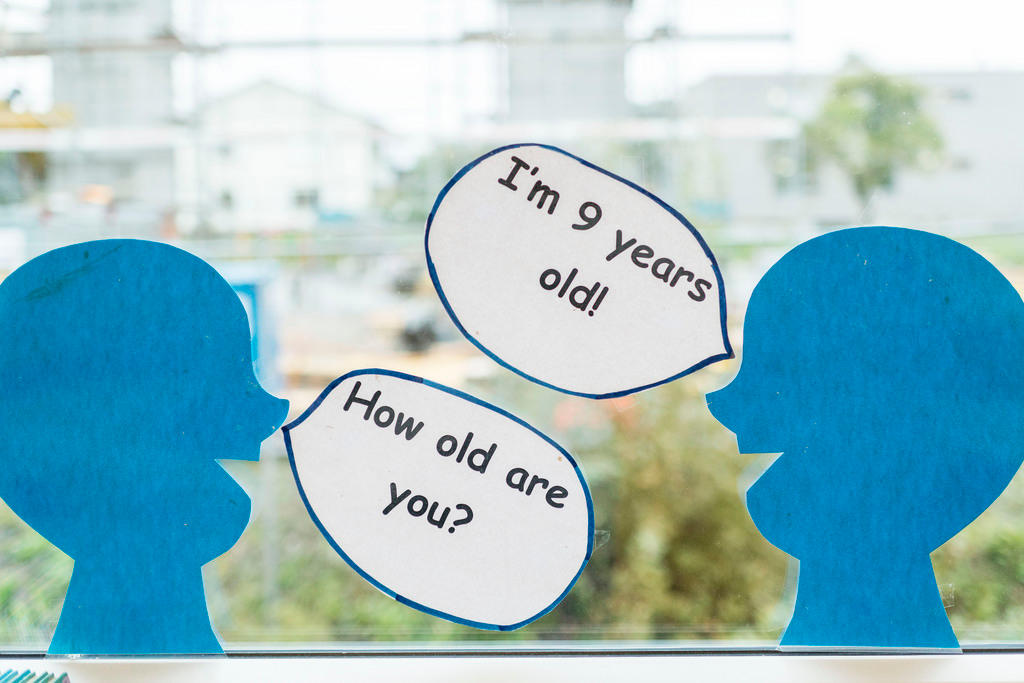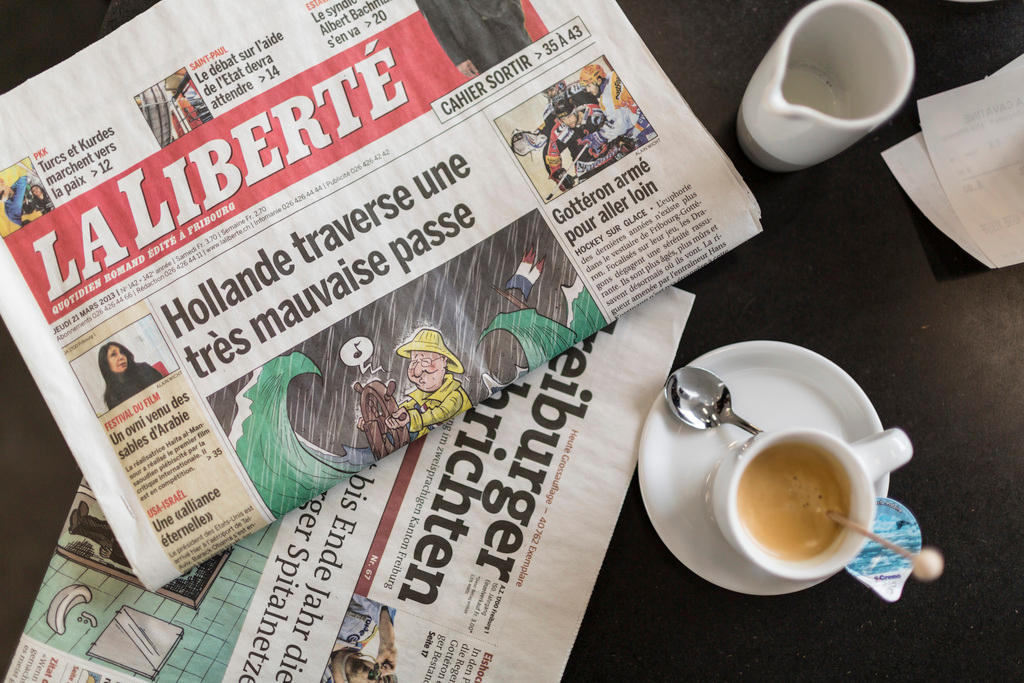English words in German: a linguistic cliffhanger

Open a newspaper, look at an advert or listen to a conversation between young(ish) people in German-speaking Switzerland and it won’t take long before you encounter an eyebrow-raising English word. A linguist explains why – and whether there will be a backlash.
Don’t judge a business magazine by its cover. I picked one up at Zurich airport a few years ago with a front page covered in words like Manager, Deal, Know-how and Branding. Only when I flicked through it did I realise it was, in fact, in German.
I thought of that when I saw a recent edition of the Neue Zürcher Zeitung (NZZ), a traditional Swiss newspaper, with the front-page headline: “Ein Cliffhanger beim Freihandel” (a free-trade cliffhanger).
Why had the journalist chosen that word? Is there really no German word he could have used? Would all readers actually know what a cliffhanger is, or would they have images of trade negotiators dangling their counterparts off rock faces?
The truth is you’re never far from an English word in Switzerland. Newspaper coverage of the US election, for example, was peppered with words like Lobbyist, Establishment, Fake-News and Rallys (Germans also have Babys and go to Partys).

More
Swinglish spoken here
Zurich’s Tages-Anzeiger observed that people going to vote in New York included “hippe Gays” and an “elegante schwarze Lady”. It also noted that many people at Trump’s victory party were wearing “Cowboyhüte und Cowboystiefel” (hats and boots).
Linguistic theft
Linguistic cross-pollination – or theft – has of course been going on forever. English dictionaries, after all, include many German words such as angst, schadenfreude and wanderlust – not forgetting the Swiss-German putsch.
“Languages, in order to remain a useful tool for communication on all levels and in all domains, need to be open and find new ways of expressing new concepts,” Franz Andres MorrisseyExternal link, a linguistics lecturer at the University of Bern, told swissinfo.ch.
He gives the example of the computer, which, when it was initially used just for crunching numbers, was referred to by German-speakers as a “Rechner”, literally something that calculates. By the time people started using them for word-processing and other non-mathematical tasks, they would talk about “der Computer”, the term used by almost all German-speakers today.
“That was a typical case where there was a new communicative need for speakers to express concepts for which there wasn’t yet a German word. And so they did what speakers do – they steal the words from where they exist,” he said.
“Languages help themselves in that respect and change all the time – if they didn’t, we’d still be speaking English like Alfred the Great!”
Pretentious?
So how does Morrissey, a Swiss with a British wife, react when he sees headlines like “Ein Cliffhanger beim Freihandel” or recent gems such as “Showdown der Dealmaker” from Swiss business magazine Bilanz or “Online Dating treibt Singles ins Burnout” from freesheet 20Minuten?
“We do seem to have an awful lot more relatively sophisticated expressions in English than before. Everyone knows about ‘foul’ or ‘goal’ and that kind of stuff from sport, but I find it interesting for words like ‘cliffhanger’ and ‘dealbreaker’, where you need a relatively high level of English to understand them,” he said.
Clownin around
The entries under C in a German dictionary make entertaining reading. There aren’t many – it’s similar to the K section in English dictionaries – but they are virtually all foreign, harvested from all around the world.
In addition to Cliffhanger and Computer, Collins (2013) includes English borrowings such as clean (off drugs), der Carvingski, das Comeback, das Cruisemissile, der Camcorder, das Carsharing, der Cocktail and der Countdown.
Another entry, which has been in the news recently as part of a bizarre social phenomenonExternal link, is der Clown – and its feminine equivalent die Clownin (adding the feminine suffix). Creepy.
“On the other hand, especially in commercial speak, in marketing speak, there’s so much empty language dressed up in that coating of English sophistication which, when we think about it, is actually pretty meaningless.”
There’s obviously nothing wrong with having a good vocabulary, but some people might find a German using words like cliffhanger slightly pretentious… “I shouldn’t perhaps say this, but I think it’s incredibly pretentious!” Morrissey admits with a laugh.
‘Game changer’
Morrissey first went to England in the mid-1970s as an assistant teacher, but he says the linguistic landscape in Switzerland had started changing before then.
“With the end of the Second World War, the influence of French as an international language waned quite drastically and was replaced by English – even in Switzerland. But until relatively recently, the mid-1980s, the importance of French in the school system was unquestioned. It’s only after that – the influence of IT and everyone becoming computer-literate – I think that was the game changer.”
Technology brought with it not only English terminology – der Web-Browser, die Email, das Cookie, surfen, chatten and many, many more – but also access to international content.
“English, especially spoken English, is so much more easily accessible thanks to YouTube, Netflix, social media and so on. Young people are much more exposed to English so they have a fairly large passive vocabulary,” Morrissey said.
“I’ve been keeping track of students’ passive knowledge of English – reading and listening comprehension – since about 1990 and administering the same test over the past 25 years. I’ve found there’s been a fairly steady increase – most noticeably since about 2008/2009 – in the average that the students scored. I’d say it’s gone up about 5% over that period, and I think that indicates they’re more exposed to the language – not necessarily using it more – and therefore have a relatively good passive knowledge of it,” he explained.
“Which, coming back to cliffhanger, is probably one of the reasons why more people would have an inkling as to what such borrowings mean than perhaps 30 years ago.”
In-group and out-group
So NZZ readers would know what a cliffhanger is? “Given that the NZZ in particular is aimed at a certain class in society, I think most people would probably have an idea – and would probably pride themselves on their level of English that they could do that.”
I suggest that the journalist might be trying to create a bond with the reader, like using a cultural reference or a private joke.
“Romansh apparently has a word for software, but nobody uses it. Everybody says ‘software’.”
“That makes a lot of sense, especially if we think of the exclusivity of the NZZ per se. It’s a well-known linguistic fact that language acts as a banner of identity. Language is also a great way to keep the in-group in and the out-group out, so you create a certain degree of exclusivity by using the language that you do. From that point of view it makes sense to make that sort of wink to the readership.”
Of course, another reason to use English words in newspaper headlines is that they might be shorter or fit better than their perfectly good German equivalents. This recent front-page headline in 20Minuten squeezed nicely onto two lines: “Digitalisierung killt bis zu 100,000 KV-Jobs” (digitalisation kills up to 100,000 office jobs).
Backlash?
As for the future, Morrissey thinks what will happen with the amount of English in German is “pretty much up for grabs”.
“I would imagine that for the moment the influx is going to continue. But it’s most likely that at some stage there’s going to be some kind of backlash, where people say let’s go back to basics or the roots. And there might be an attempt to look for German equivalents,” he said.
“Those equivalents might take hold if they’re attractive enough, but if everybody knows the English word, there’s little point. There’s little point in introducing a term that people have to ‘learn’ if there’s one that they already know. For example Romansh [a Swiss national language spoken in canton Graubünden] apparently has a word for software, but nobody uses it. Everybody says ‘software’.”
So, after all this, what is the German word for cliffhanger? Morrissey says he can’t think of one – “nothing as concise as that, anyway” – so let’s go to the dictionary. Pons (2007) translates it as “der Thriller”, but Collins (2013) has upgraded it to “der Superthriller”! Make of that what you will…
Swinglish
The English words examined in this article are all perfectly good English words used as native English-speakers would use them.
However, the Swiss – and indeed non-native speakers around the world – also use words which look like English, and might even be English, but which no native speaker would use, at least not in the sense intended. Welcome to the world of Swinglish.
“Das Handy” is one of the best-known examples. This is what German speakers call their mobile/cell phones, although most people nowadays probably have “ein Smartphone”.
“Ein Shooting” is another one. The company that was suggesting you give someone a shootingExternal link for Valentine’s Day wasn’t encouraging a crime of passion, rather a photo shoot. “Mobbing” appears quite frequently (along with the verb “mobben”), meaning bullying. “Ein Rowdy” is a hooligan or troublemaker.
“When you look at the English that you find in non-English-speaking countries, you could say we all speak bad English quite well – and therefore we take certain liberties with the language,” Morrissey said.
“But I think the point is that when you have a language that is so widely spoken, and the vast majority of speakers are second-language speakers, you have to realise that the English language is no longer in the ownership of English speakers. English – like Swiss-German – doesn’t really have that central language-planning policy. Which is a good thing. But it also means of course that it develops in different directions.”
What do you think about the amount of English used in German? Do you have any favourite examples? Let us know!

In compliance with the JTI standards
More: SWI swissinfo.ch certified by the Journalism Trust Initiative












Join the conversation!